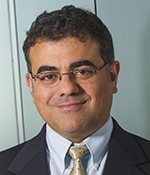
Amir A. Zeki, MD
Asthma and chronic obstructive pulmonary disease are separate diseases, but recent research has uncovered more information about patients who have symptoms of both and suffer from asthma-COPD overlap syndrome (ACOS). A Sunday symposium will examine these findings and discuss diagnosis and treatment.
“Bringing Order to the Chaos of ACOS” will feature six speakers who will discuss how to distinguish ACOS from asthma and COPD, the shared immunity in asthma and COPD, the genetic origins of ACOS, the role of smoking in asthma, and ACOS therapies. The session is from 2:15 to 4:15 p.m. Sunday in Moscone Center, Room 2005/2007 (West Building, Level 2).
“ACOS is a real entity, but it is not yet defined. The Global Initiative for Asthma 2015 guidelines describe ACOS. In the last two years, there has been an explosion of interest and papers published on the topic. However, we still lack a full understanding of this condition,” says Amir A. Zeki, MD, one of the session chairs.
Although research has opened doors to learning more about ACOS, many questions remain. It is known that 15-55 percent of patients with obstructive lung disease have ACOS. Compared to other patients, they have more symptoms, greater declines in lung function, an increased risk of severe exacerbations, and a possibility of reduced life span.
“I hope that we can come away with a deeper understanding of this condition in order to eventually agree on a definition,” says Dr. Zeki, assistant professor of medicine at the University of California, Davis, School of Medicine, and co-director of the U.C. Davis Asthma Network Clinic. “This will take some time since much more research is needed. Given that ACOS patients seem to have more symptoms and greater disease severity, yet are younger than those with COPD, we urgently need to develop better and perhaps targeted therapies for those with overlap.”
Speakers will discuss molecular, pathophysiological, and clinical features of ACOS and how this information fits in with the differing British and Dutch hypotheses about the pathogenesis of COPD, which were developed in the 1960s.
“My hope is that the audience will also have a chance to discuss and appreciate the significant heterogeneity and overlap between asthma and COPD, where ACOS serves as an emerging and important clinical phenotype linking both diseases,” Dr. Zeki says.
“Bringing Order to the Chaos of ACOS (Asthma-COPD Overlap Syndrome)” (A86) is supported by educational grants from AstraZeneca LP, Genentech, GlaxoSmithKline, Meda Pharmaceuticals, Inc., and Teva Pharmaceuticals.
Related Education Sessions
Several other education sessions focus on the diagnosis and treatment of asthma.
Sunday, 9-11 a.m.
Joint ATS/ERS/JRS Symposium on Severe Asthma: A Global Perspective
Moscone Center, Room 2001/2003 (West Building, Level 2)
“Joint ATS/ERS/JRS Symposium on Severe Asthma: A Global Perspective” (A6) is supported by educational grants from AstraZeneca LP, Genentech, GlaxoSmithKline, Meda Pharmaceuticals, Inc., and Teva Pharmaceuticals.
Monday, 9-11 a.m.
New Concepts in Asthma Biology
Moscone Center, Room 2005/2007 (West Building, Level 2)
“New Concepts in Asthma Biology” (B10) is supported by educational grants from AstraZeneca LP, Genentech, GlaxoSmithKline, Meda Pharmaceuticals, Inc., Sanofi US and Regeneron Pharmaceuticals, and Teva Pharmaceuticals.
Tuesday, 2:15-4:15 p.m.
Emerging Immune Functions of the Pulmonary Epithelium in Infection, Asthma, and Chronic Lung Disease
Moscone Center, Room 2005/2007 (West Building, Level 2)
Wednesday, 8-8:45 a.m.
Biomarkers for Precision Medicine in Asthma
Moscone Center, Room 134 (North Building, Lower Level)
“Biomarkers for Precision Medicine in Asthma” (K7) is supported by educational grants from AstraZeneca LP, Genentech, GlaxoSmithKline, Meda Pharmaceuticals, Inc., Sanofi US and Regeneron Pharmaceuticals, and Teva Pharmaceuticals.
9-11 a.m.
Clinical Year in Review 4: Asthma
Moscone Center, Gateway Ballroom 102-104 (South Building, Lower Level)
“Clinical Year in Review 4: Asthma” (D1) is supported by educational grants from Actelion Pharmaceuticals US, Inc., AstraZeneca LP, Boehringer Ingelheim Pharmaceuticals, Inc., Genentech, GlaxoSmithKline, Meda Pharmaceuticals, Inc., Sanofi US and Regeneron Pharmaceuticals, Teva Pharmaceuticals, and United Therapeutics Corporation.
Exploiting GPCRS for New and Improved Asthma Medicine
Moscone Center, Room 2002/2004 (West Building, Level 2)
“Exploiting GPCRS for New and Improved Asthma Medicine (D7) is supported by educational grants from AstraZeneca LP, Genentech, GlaxoSmithKline, Meda Pharmaceuticals, Inc., and Teva Pharmaceuticals.
11:45-1:15 p.m.
Precision Medicine in Asthma: Current Practice, Gaps, Future Directions
Moscone Center, Room 302 (South Building, Esplanade Level)
